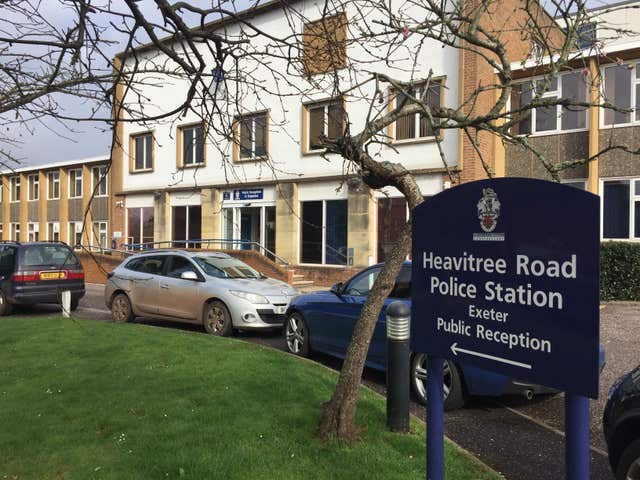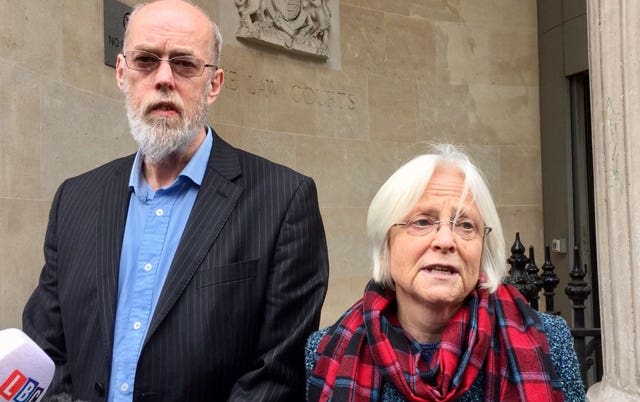
A police force has been fined £234,500 for health and safety breaches in relation to a belt used around the face of a man before he collapsed in custody.
Thomas Orchard, 32, died in hospital seven days after being arrested and taken to Heavitree Road police station in Exeter, Devon, in October 2012.
During his detention, the church caretaker who had mental health issues was restrained and an emergency response belt (ERB) was placed across face for five minutes and two seconds to prevent spitting or biting.
In a landmark conviction in 2018, the office of the chief constable of Devon and Cornwall Police pleaded guilty to breaches under the Health and Safety at Work Act.
 An Emergency Response Belt used to restrain Thomas Orchard (IPCC/PA)
An Emergency Response Belt used to restrain Thomas Orchard (IPCC/PA)
The charge stated that the force failed to ensure non-employees, including Mr Orchard, were not exposed to risks in connection with the ERB.
Judge Julian Lambert previously ruled he could not be sure that the ERB, a tough webbing belt designed to restrain limbs, was a contributory factor in Mr Orchard’s death.
He fined the force £234,500 and ordered it to pay £20,515 in prosecution costs during a hearing at Bristol Crown Court on Friday.
The judge described the seriousness of harm risked by the force’s breaches due to the “potential restriction of breathing” by use of the ERB about the head and face.
 Heavitree Road Police Station Claire (Hayhurst/pa)
Heavitree Road Police Station Claire (Hayhurst/pa)
“I appreciate that there is a significant body of evidence that no-one was, in fact, killed or very seriously injured because of the use of the belt as a spit or bite guard,” Judge Lambert said.
“It is, however, my assessment that it was only a matter of time before someone was going to be.
“The ERB didn’t automatically restrict breathing when used as a hood, but it had the capacity to do so in certain situations.”
Mr Orchard was suffering from a mental health crisis when he was arrested in Exeter city centre for a public order offence at about 11am on October 3 2012.
The judge said that “very serious consequences” could occur if the belt restricted the breathing of a person in an “excited and possibly delirious” state.
He previously ruled it was not clear whether the ERB obstructed Mr Orchard’s breathing.
 Shaun Sawyer, the Chief Constable of Devon and Cornwall Police, speaking to media outside Bristol Crown Court (Claire Hayhurst/PA)
Shaun Sawyer, the Chief Constable of Devon and Cornwall Police, speaking to media outside Bristol Crown Court (Claire Hayhurst/PA)
Devon and Cornwall Police approved the ERB as a limb restraint only in 2002, but within months it was being used as a spit or bite guard, the court previously heard.
In 2003, force policy was changed to allow for the ERB to be applied “loosely about the head” to prevent head-butting, spitting or biting.
Judge Lambert said this occurred without any risk assessment or research being carried out on the effects of the ERB “as a hood”.
“The prosecution properly characterises this as a fundamentally flawed process,” he said.
“This was accompanied with a lack of uniformity in training.”
In a report 11 years before Mr Orchard’s death, Dr Graham Cook said he believed using the ERB as a spit or bite guard was “extremely dangerous”.
This report was available to Devon and Cornwall Police in 2002 but it did not “properly appreciate” the concerns it raised, the judge said.
“There was an alarming inadvertence to risk,” he added.
 Alison and Ken Orchard, the parents of Thomas Orchard, at a previous hearing (Claire Hayhurst/PA)
Alison and Ken Orchard, the parents of Thomas Orchard, at a previous hearing (Claire Hayhurst/PA)
In mitigation, Jason Beer QC said the belt had been used an estimated 500 times about the head by the force.
There were no reports of any injury during the 10-year period it was used in that way before Mr Orchard’s death.
“The use of the device did not, on the evidence, cause actual harm to any person,” he said.
He said any fine would have to be funded by a halt in recruitment – with every £100,000 resulting in the reduction of three recruits.
In a victim personal statement partly read to the court, Mr Orchard’s mother Alison Orchard said: “It has been painful to witness how an organisation which had a duty of care for Thomas was so casual, disorganised and sloppy in their approach to health and safety.”
BREAKING: The Office of the Chief Constable for @DC_Police has just been sentenced for health & safety breaches following the death of Thomas Orchard in October 2012. The judge has ordered they pay a fine of £234,500, as well as costs of £20,515. Media release to follow. pic.twitter.com/j5vPzRLR2d
— INQUEST (@INQUEST_ORG) May 3, 2019
Speaking outside court, Mr Orchard’s father Ken Orchard said the family had received “no sense of real justice”.
“Investigations over the past six-and-a-half years have highlighted some criminally appalling health and safety practices which desperately needed changing,” he said.
“We hope more than anything that the residents of Devon and Cornwall will be at least a little safer today as a result of Thomas’s death.”
Shaun Sawyer, the chief constable of the force, said it had made “critical changes from a very early stage in 2012”.
“Devon and Cornwall Police is a very different organisation six and half a years on from Thomas Orchard’s death in terms of the training delivered to staff, awareness of mental health crisis and our ability to identify and manage violent, vulnerable people coming into police contact,” he said.


Comments & Moderation
Readers’ comments: You are personally liable for the content of any comments you upload to this website, so please act responsibly. We do not pre-moderate or monitor readers’ comments appearing on our websites, but we do post-moderate in response to complaints we receive or otherwise when a potential problem comes to our attention. You can make a complaint by using the ‘report this post’ link . We may then apply our discretion under the user terms to amend or delete comments.
Post moderation is undertaken full-time 9am-6pm on weekdays, and on a part-time basis outwith those hours.
Read the rules here